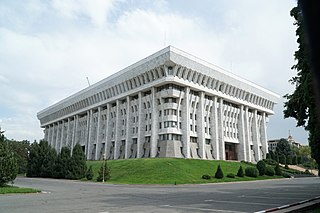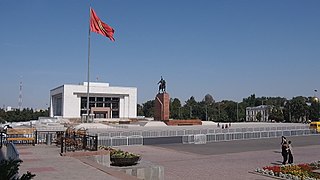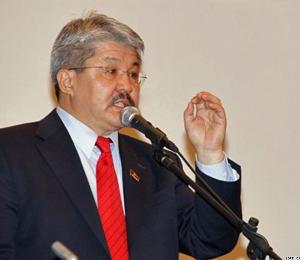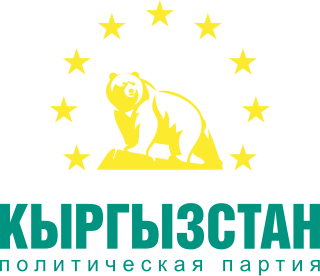
The history of the Kyrgyz people and the land now called Kyrgyzstan goes back more than 3,000 years. Although geographically isolated by its mountainous location, it had an important role as part of the historical Silk Road trade route. Turkic nomads, who trace their ancestry to many Turkic states such as the First and Second Turkic Khaganates, have inhabited the country throughout its history. In the 13th century, Kyrgyzstan was conquered by the Mongols; subsequently it regained independence but was invaded by Kalmyks, Manchus, and Uzbeks. In 1876, it became part of the Russian Empire, remaining in the USSR as the Kirghiz Soviet Socialist Republic after the Russian Revolution. Following Mikhael Gorbachev's democratic reforms in the USSR, in 1990 pro-independence candidate Askar Akayev was elected president of the SSR. On 31 August 1991, Kyrgyzstan declared independence from Moscow, and a democratic government was subsequently established.

The politics of Kyrgyzstan, officially known as the Kyrgyz Republic, takes place in the framework of a presidential system representative democratic republic, whereby the President is head of state and the Chairman of the Cabinet of Ministers is head of government. Executive power is exercised by the government. Legislative power is vested in both the government and parliament. The Economist Intelligence Unit rated Kyrgyzstan an "authoritarian regime" in 2022.

Kyrgyzstan has close relations with other members of the Commonwealth of Independent States, particularly Kazakhstan and Russia, given the historical legacy of the Soviet Union. It also has close relations with Turkey as well, given their shared heritage as Turkic languages.

Kyrgyzstan, officially the Kyrgyz Republic, is a landlocked country in Central Asia, lying in the Tian Shan and Pamir mountain ranges. Bishkek is the capital and largest city of the country. Kyrgyzstan is bordered by Kazakhstan to the north, Uzbekistan to the west, Tajikistan to the south, and China to the east and southeast. With a population of 6.7 million, Kyrgyzstan is the 34th-most populous country in Asia, and the 4th-most populous country in Central Asia. Ethnic Kyrgyz make up the majority of the country's seven million people, followed by significant minorities of Uzbeks and Russians.

Askar Akayevich Akayev is a Kyrgyz politician who served as President of Kyrgyzstan from 1990 until being overthrown in the March 2005 Tulip Revolution.
The Tulip Revolution or First Kyrgyz Revolution led to President of Kyrgyzstan Askar Akayev's fall from power. The revolution began after parliamentary elections on February 27 and March 13, 2005. The revolutionaries alleged corruption and authoritarianism by Akayev, his family and supporters. Akayev fled to Kazakhstan and then to Russia. On April 4, 2005, at the Kyrgyz embassy in Moscow, Akayev signed his resignation statement in the presence of a Kyrgyz parliamentary delegation. The resignation was ratified by the Kyrgyz interim parliament on April 11, 2005.

The White House is the presidential office building in Bishkek, Kyrgyzstan. The White House was the site of riots during both the 2005 Tulip Revolution and the 2010 Kyrgyzstani riots. During the 2010 riots a fire broke out and damaged portions of the building and destroyed the hard copies of many government records.

Kurmanbek Saliyevich Bakiyev is a Kyrgyz politician who served as the second president of Kyrgyzstan, from 2005 to 2010. Large opposition protests in April 2010 led to the takeover of government offices, forcing Bakiyev to flee the country.
Bermet Askarevna Akayeva is a Kyrgyz politician and former MP. She is the daughter of ousted former President of Kyrgyzstan Askar Akayev. She graduated from the Frunze physics and mathematics school in 1989, studied at the Faculty of Computational Mathematics and Cybernetics, Moscow State University from 1989 to 1992 and at the Business School of Lausanne from 1992 to 1994. After receiving her MBA in 1994 she worked in the United Nations Compensation Commission in Geneva as a legal assistant. In 2000, she moved to Kyrgyzstan and became involved in business there.

Presidential elections were held in Kyrgyzstan on 10 July 2005. The result was a landslide victory for acting President Kurmanbek Bakiyev, marking the end of his interim government formed after the previous president, Askar Akayev, was overthrown in the revolution in March 2005.
Bayaman Erkinbayev was a top Kyrgyzstani lawmaker and parliamentary deputy, who was the driving force behind the riots in southern Kyrgyzstan that led to the overthrow of President Askar Akayev on March 24, 2005. One of the richest businessman in the country, he funded the Central Asian state's Socialist Party. He had announced his candidacy for the presidency in the July 2005 elections, but bowed down long before the vote, when his party supported former security chief and Bishkek mayor, Felix Kulov.

The Supreme Council is the unicameral parliament of the Kyrgyz Republic. It was known as the Supreme Soviet of the Kirghiz Soviet Socialist Republic until 1991.

Almazbek Sharshen uulu Atambayev is a Kyrgyz politician who served as the President of Kyrgyzstan from 1 December 2011 to 24 November 2017. He was Prime Minister of Kyrgyzstan from 17 December 2010 to 1 December 2011, and from 29 March 2007 to 28 November 2007. He served as Chairman of the Social Democratic Party of Kyrgyzstan (SDPK) from 30 July 1999 to 23 September 2011.
Daniar Toktogulovich Usenov is a Kyrgyz banker and politician who served as the Prime Minister of Kyrgyzstan from October 2009 to April 2010. He previously served as Mayor of Bishkek.

Kazakhstan–Kyrgyzstan relations refers to the bilateral diplomatic relations between the Republic of Kazakhstan and the Kyrgyz Republic. Bilateral relationships between the countries, which share a border, are very strong and Kyrgyz and Kazakh are very close in terms of language, culture and religion. Kyrgyz-Kazakh relationships have always been at very high level and economic and other formal connections of two countries have been greeted with strong appreciation by both nations since the two share a lot in common.

Ala-Too Square is the central square in Bishkek, Kyrgyzstan.

Bakyt Beshimov is a leader of parliamentary fraction and deputy chairman of Social Democratic Party of Kyrgyzstan. Bakyt Beshimov is a prominent opposition leader, famous for his liberal views, and speaking out against Kurmanbek Bakiyev's and Askar Akayev's regimes.

Greece–Kyrgyzstan relations are foreign relations between Greece and Kyrgyzstan. Both countries established diplomatic relations in 1992. Greece is represented in Kyrgyzstan through its embassy in Almaty (Kazakhstan). Kyrgyzstan is represented in Greece through a non resident ambassador based in Bishkek. Kyrgyz consular representation in Greece is made by the Kazakh consulate in Athens. What is now Kyrgyzstan was settled by Scythians and was conquered by Alexander the Great.

Presidential elections were held in Armenia on 19 February and 5 March 2003. No candidate received a majority in the first round of the election with the incumbent President Robert Kocharyan winning slightly under 50% of the vote. Therefore, a second round was held and Kocharyan defeated Stepan Demirchyan with official results showed him winning just over 67% of the vote. However, both the opposition and international observers said that the election had seen significant amounts of electoral fraud and the opposition did not recognise the results of the election.

Kyrgyzstan is an eponymously-named centrist political party in Kyrgyzstan. It was established in May 2015, by Kanatbek Isaev, a former Respublika Member of Parliament. It is viewed as "utterly apolitical" and focuses on supporting the government of Kyrgyz President Sooronbay Jeenbekov.

















